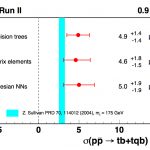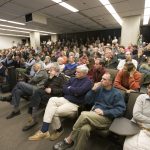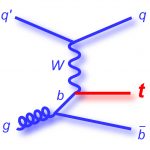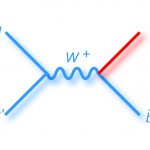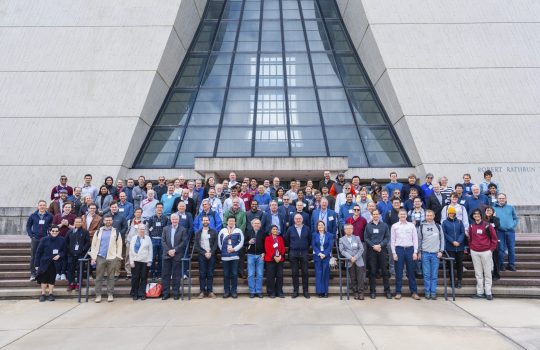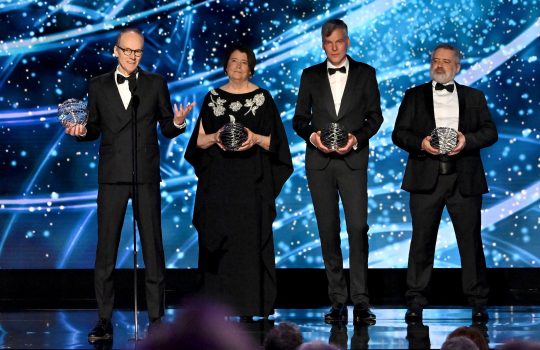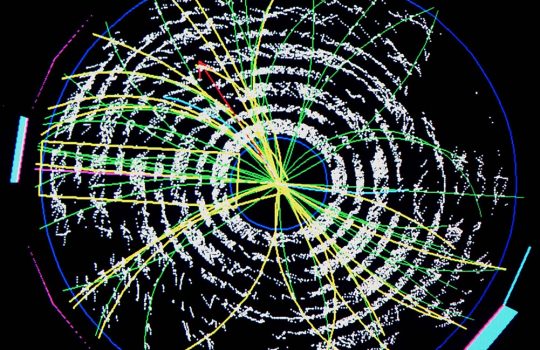Batavia, Ill.–Scientists of the DZero collaboration at the Department of Energy’s Fermi National Accelerator Laboratory announced in a seminar at Fermilab on December 8, 2006 the first evidence of single top quarks produced in a rare subatomic process involving the weak nuclear force. The result is an important test of predictions made by particle theory, such as the number of quarks that exist in nature. In the longer term, the techniques employed in this analysis will allow scientists to search for an even more elusive particle, the Higgs boson.
“I am delighted by the DZero results and what they portend for the future,” said Fermilab Director Pier Oddone.
Starting from a million billion proton-antiproton collisions produced by Fermilab’s Tevatron, the world’s most powerful particle collider, the DZero collaboration used modern sophisticated analysis techniques to search for about 60 collisions, each containing a single top quark. Up to now, scientists had observed the top quark only in subatomic processes involving the strong nuclear force, which produces pairs of top and antitop quarks. Those observations, made by both the DZero and CDF experiments at Fermilab, led to the discovery of the top quark in 1995.
“Observing a few single top quarks in a sea of billions of particle collisions represents an extraordinary technical tour de force,” said Dr. Robin Staffin, Associate Director for High Energy Physics in DOE’s Office of Science. “The power and sophistication of experimental analysis techniques like those developed by the DZero experimenters augur well for exciting discoveries to come.”
Separating a handful of single-top events from two billion events recorded since 2002 allowed the DZero collaboration to determine one of the most important unmeasured parameters of the Standard Model of particles and forces, known as Vtb (pronounced “VTB”). This parameter determines the rate of single-top production: If there are only six quarks, as scientists have observed so far, theory predicts the magnitude of Vtb to be close to one. Departures from this magnitude would be a sign of new physics, indicating the existence of additional quarks or other fundamental particles. The DZero collaboration determined the magnitude of Vtb to lie within the range of .68 to 1.0 with a 95 percent probability, consistent with the Standard Model. Collecting more collision data and further refining the analysis will yield tighter constraints on the value in the upcoming months.
The signature of single-top events is easily mimicked by other subatomic processes that occur at much higher rates. To stand a chance of seeing the single-top signal, physicists at the DZero experiment had to develop sophisticated selection procedures. The first stage selected approximately 1,400 candidate events. Of these candidates, only about 60 single-top events were expected, and experimenters exploited every bit of information to unambiguously establish their presence. DZero scientists used three different techniques to combine some 50 discriminating variables to represent the results. These distributions allowed physicists to recognize the presence of single-top events-much like a mother’s uncanny ability to distinguish between identical twins. The results of the analysis will be submitted this week for publication in Physical Review Letters.
“This analysis is an important milestone in our continuing search for the Higgs boson, the missing keystone in the Standard Model,” said DZero cospokesperson Terry Wyatt, of the University of Manchester, UK. “The discovery of the Higgs boson would help explain why particles have mass. Observing the Higgs requires us to see very low rate signals in the presence of substantial backgrounds. The sophisticated analysis techniques we are honing in our current analyses will be directly applicable to our Higgs searches.”
DZero cospokesperson Dmitri Denisov, of Fermilab congratulated his fellow collaborators.
“This exciting result would not be possible without the tireless efforts of over 600 DZero scientists and the wonderful accelerator that produced all these collisions,” Denisov said. “Bravo to the Tevatron and the people who make the machine work. The search to understand the fundamental forces of nature is mankind’s timeless quest, and it has led us to the discovery of powerful physics laws, new technologies and benefits for society.”
Notes for editors:
DZero is an international experiment conducted by physicists from 90 institutions and 20 countries. Fermilab is a Department of Energy Office of Science national laboratory operated under contract by Universities Research Association, Inc.
InterAction Collaboration media contacts:
Institute of High Energy Physics, Beijing, Peoples Republic of China: + 86 10 88233105, xutz@mail.ihep.ac.cn
DAPNIA CEA-Saclay, France: Yves Sacquin, + 33 01 69 08 60 81, sacquin@dapnia.cea.fr
IN2P3-CNRS, France: Alain de Bellefon, + 33 01 44 96 47 51, bellefon@in2p3.fr
NIKHEF, Netherlands: Gabby Zegers, + 31 20 592 5075, gabbyz@nikhef.nl
Joint Institute for Nuclear Research, Dubna, Russia: Boris Starchenko, + 7 096 221 6 38 24, irinak@jinr.ru
Particle Physics and Astronomy Research Council (PPARC), United Kingdom: Peter Barratt, + 44 (0) 1793 442025, + 44 (0) 787 602 899 (mobile), peter.barratt@pparc.ac.uk
Lawrence Berkeley National Laboratory, California, USA: Lynn Yarris, +1-510-486-5375, LCYarris@lbl.gov
DZero collaborating institutions:
Universidad de Buenos Aires, Buenos Aires, Argentina
LAFEX, Centro Brasileiro de Pesquisas Fisicas, Rio de Janeiro, Brazil
Universidade do Estado do Rio de Janeiro, Rio de Janeiro, Brazil
Instituto de Fisica Teorica, Universidade Estadual Paulista, Sao Paulo, Brazil
University of Alberta, McGill University, Simon Fraser University and York University, Canada
University of Science and Technology of China, Hefei, People’s Republic of China
Universidad de los Andes, Bogota, Colombia
Charles University, Center for Particle Physics, Prague, Czech Republic
Czech Technical University, Prague, Czech Republic
Institute of Physics, Academy of Sciences, Center for Particle Physics, Prague, Czech Republic
Universidad San Francisco de Quito, Quito, Ecuador
Laboratoire de Physique Corpusculaire, IN2P3-CNRS, Universite Blaise Pascal, Clermont-Ferrand, France
Laboratoire de Physique Subatomique et de Cosmologie, IN2P3-CNRS, Universite de Grenoble, Grenoble, France
CPPM, IN2P3-CNRS, Universite de la Mediterranee, Marseille, France
Laboratoire de l’Accelerateur Lineaire, IN2P3-CNRS et Universite Paris-Sud, Orsay, France
LPNHE, Universites Paris VI and VII, IN2P3-CNRS, Paris, France
DAPNIA/Service de Physique des Particules, CEA, Saclay, France
IPHC, IN2P3-CNRS, Universite Louis Pasteur Strasbourg, and Universite de Haute Alsace, France
Institut de Physique Nucleaire de Lyon, IN2P3-CNRS, Universite Claude Bernard, Villeurbanne, France
RWTH Aachen, III. Physikalisches Institut A, Aachen, Germany
Universitat Bonn, Physikalisches Institut, Bonn, Germany
Universitat Freiburg, Physikalisches Institut, Freiburg, Germany
Universitat Mainz, Institut fur Physik, Mainz, Germany
Ludwig-Maximilians-Universitat Munchen, Munchen, Germany
Fachbereich Physik, University of Wuppertal, Wuppertal, Germany
Panjab University, Chandigarh, India
Delhi University, Delhi, India
Tata Institute of Fundamental Research, Mumbai, India
University College Dublin, Dublin, Ireland
Korea Detector Laboratory, Korea University, Seoul, Korea
SungKyunKwan University, Suwon, Korea
CINVESTAV, Mexico City, Mexico
FOM-Institute NIKHEF and University of Amsterdam/NIKHEF, Amsterdam, The Netherlands
Radboud University Nijmegen/NIKHEF, Nijmegen, The Netherlands
Joint Institute for Nuclear Research, Dubna, Russia
Institute for Theoretical and Experimental Physics, Moscow, Russia
Moscow State University, Moscow, Russia
Institute for High Energy Physics, Protvino, Russia
Petersburg Nuclear Physics Institute, St. Petersburg, Russia
Lund University, Royal Institute of Technology, Stockholm University, and Uppsala University, Sweden
Physik Institut der Universitat Zurich, Zurich, Switzerland
Lancaster University, Lancaster, United Kingdom
Imperial College, London, United Kingdom
University of Manchester, Manchester, United Kingdom
Hochiminh City Institute of Physics, Hochiminh City, Vietnam
University of Arizona, Tucson, Arizona 85721, USA
Lawrence Berkeley National Laboratory and University of California, Berkeley, California 94720, USA
California State University, Fresno, California 93740, USA
University of California, Riverside, California 92521, USA
Florida State University, Tallahassee, Florida 32306, USA
Fermi National Accelerator Laboratory, Batavia, Illinois 60510, USA
University of Illinois at Chicago, Chicago, Illinois 60607, USA
Northern Illinois University, DeKalb, Illinois 60115, USA
Northwestern University, Evanston, Illinois 60208, USA
Indiana University, Bloomington, Indiana 47405, USA
University of Notre Dame, Notre Dame, Indiana 46556, USA
Purdue University Calumet, Hammond, Indiana 46323, USA
Iowa State University, Ames, Iowa 50011, USA
University of Kansas, Lawrence, Kansas 66045, USA
Kansas State University, Manhattan, Kansas 66506, USA
Louisiana Tech University, Ruston, Louisiana 71272, USA
University of Maryland, College Park, Maryland 20742, USA
Boston University, Boston, Massachusetts 02215, USA
Northeastern University, Boston, Massachusetts 02115, USA
University of Michigan, Ann Arbor, Michigan 48109, USA
Michigan State University, East Lansing, Michigan 48824, USA
University of Mississippi, University, Mississippi 38677, USA
University of Nebraska, Lincoln, Nebraska 68588, USA
Princeton University, Princeton, New Jersey 08544, USA
State University of New York, Buffalo, New York 14260, USA
Columbia University, New York, New York 10027, USA
University of Rochester, Rochester, New York 14627, USA
State University of New York, Stony Brook, New York 11794, USA
Brookhaven National Laboratory, Upton, New York 11973, USA
Langston University, Langston, Oklahoma 73050, USA
University of Oklahoma, Norman, Oklahoma 73019, USA
Oklahoma State University, Stillwater, Oklahoma 74078, USA
Brown University, Providence, Rhode Island 02912, USA
University of Texas, Arlington, Texas 76019, USA
Southern Methodist University, Dallas, Texas 75275, USA
Rice University, Houston, Texas 77005, USA
University of Virginia, Charlottesville, Virginia 22901, USA
University of Washington, Seattle, Washington 98195, USA
- This figure shows the total single top-quark production cross section measured by each of the three different analysis techniques applied to the DZero data sample. The red dots indicate the measured values and the red lines represent the uncertainty on each measurement. The blue band is the value predicted by the Standard Model.
- Fermilab’s DZero collaboration announced that it has found, for the first time ever, evidence for top quarks produced singly, rather than in pairs. Dugan O’Neil from Simon Fraser University presented the results at a seminar Friday, December 8.
- Fermilab’s DZero collaboration announced that it has found, for the first time ever, evidence for top quarks produced singly, rather than in pairs. Dugan O’Neil from Simon Fraser University presented the results at a seminar Friday, December 8.
- Dugan O’Neil presented the results to a group of Fermilab physicists Friday.
- Fermilab Director Pier Oddone and Deputy Director Young-Kee Kim at Friday’s presentation.
- These two ‘Feynman diagrams’ represent the processes that lead to the production of single quark events of the kind seen by DZero.
- These two ‘Feynman diagrams’ represent the processes that lead to the production of single quark events of the kind seen by DZero.

